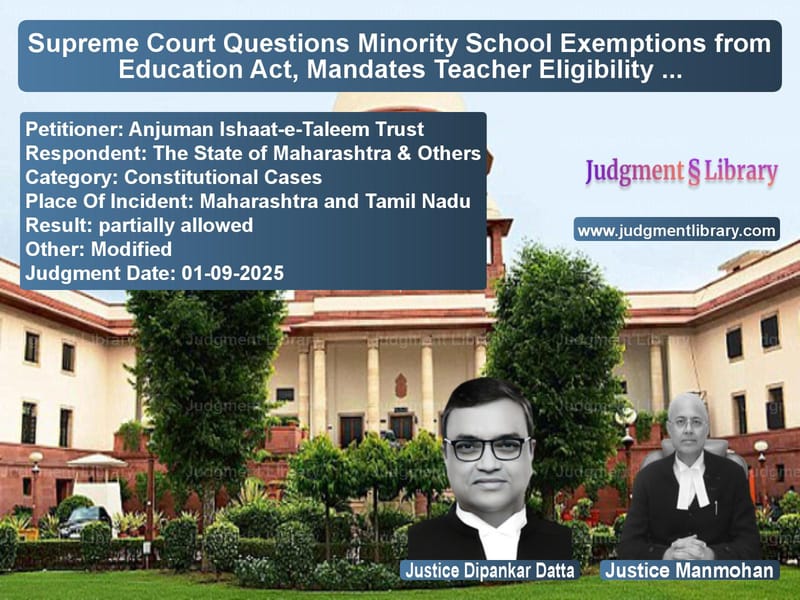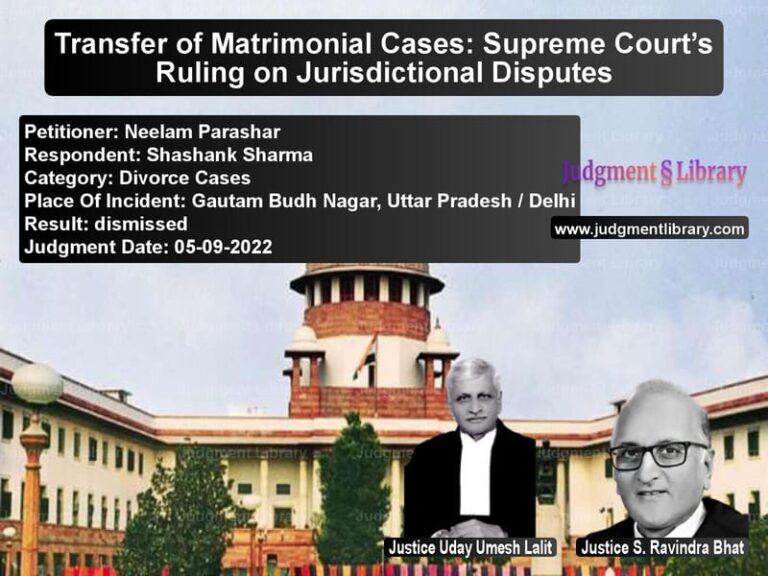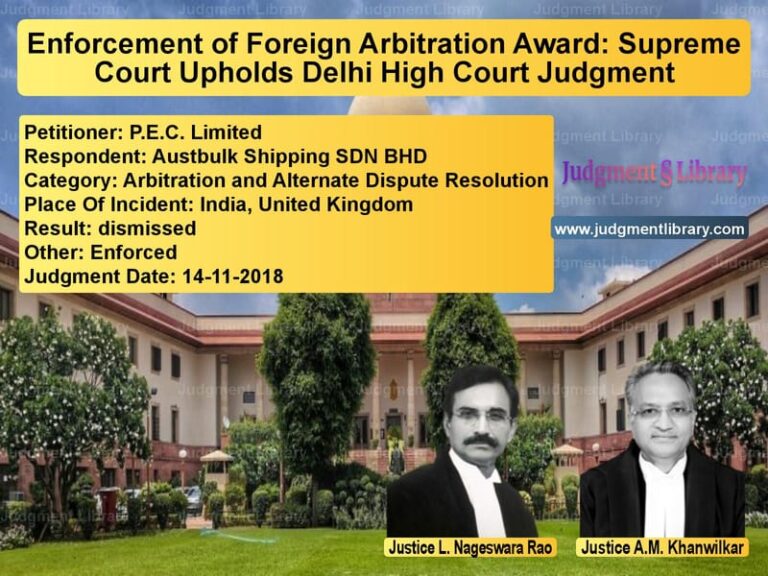Supreme Court Questions Minority School Exemptions from Education Act, Mandates Teacher Eligibility Test
In a landmark judgment that could reshape India’s educational landscape, the Supreme Court has expressed serious doubts about exempting minority schools from the Right to Education Act while making the Teacher Eligibility Test mandatory for both new appointments and promotions. The case, which brings together multiple appeals from Maharashtra and Tamil Nadu, delves into the complex interplay between the fundamental right to education and the cultural rights of minorities.
The legal battle centers around whether minority educational institutions can be compelled to follow the Right of Children to Free and Compulsory Education Act, 2009, particularly its requirement that teachers must qualify the Teacher Eligibility Test. The court noted that “the RTE Act breathed life into Article 21A by providing a comprehensive statutory framework to ensure access to free, compulsory, and quality elementary education for all children in the 6–14 age group.”
The Constitutional Conflict
At the heart of this legal dispute lies the apparent tension between two fundamental rights: Article 21A, which guarantees the right to education, and Article 30(1), which protects the rights of minorities to establish and administer educational institutions of their choice. The court observed that “if a conflict were ever to arise between the two competing fundamental rights, i.e., Article 21A and Article 30, it must be remembered that not all rights stand on equal footing when their purposes diverge and reconciliation is no longer possible.”
The judgment extensively analyzed whether Article 30(1) provides blanket immunity from all forms of regulation to minority institutions. The court questioned this interpretation, stating “Article 30(1) has never been construed as conferring blanket immunity on minority institutions from all forms of regulation.” The bench emphasized that basic requirements related to infrastructure, teacher qualifications, and inclusive access do not interfere with a school’s minority character.
Arguments from Both Sides
The petitioners, including minority educational institutions and individual teachers, argued against making TET mandatory. They contended that “the RTE Act is not applicable to minority institutions, and would be in violation of Article 30” and that “TET is not a ‘minimum qualification’ under Section 23 of the RTE Act, but it is merely an eligibility test to assess teaching aptitude.” They also argued that imposing TET qualification for promotion may cause stagnation, which could not have been Parliament’s intention.
On the other side, the respondents, including various state governments and the Union of India, supported the mandatory nature of TET. They argued that “the right of each and every child to be taught by qualified teachers is integral to Right to Education” and that “to exempt a particular category of institutions would be contrary to Article 21A of the Constitution of India and create an artificial distinction.” They emphasized that “the State holds a positive obligation to ensure that every child, irrespective of caste, creed or religion, receives quality education on equal footing.”
Consequences of Exclusion
The court expressed deep concern about the practical consequences of exempting minority institutions from the RTE Act. Referring to a National Commission for Protection of Child Rights study, the judgment noted that “only 8.76% of students in minority schools come from socially and economically disadvantaged sections” and that “an overwhelming 62.5% of the total students in minority schools belong to non-minority communities.”
The bench observed that “the decision in Pramati Educational and Cultural Trust (supra) might have, unknowingly, jeopardized the very foundation of universal elementary education” and that “exemption of minority institutions from the RTE Act leads to fragmentation of the common schooling vision and weakening of the idea of inclusivity and universality envisioned by Article 21A.”
Teacher Qualifications and Quality Education
The court strongly emphasized the crucial role of qualified teachers in delivering quality education. The judgment stated that “quality of teachers and teaching standards are integral to the fundamental right to education under Article 21A cannot perhaps be doubted” and that “compromising the quality of a teacher would necessarily compromise quality of education, and is a direct threat to the right of children to quality education.”
Regarding the requirement for in-service teachers to qualify TET, the court held that “the TET is indeed a qualification, necessary to be held by a person seeking appointment as a teacher in a school” and that “those in-service teachers who aspire for promotion, irrespective of the length of their service, have to qualify the TET in order to be eligible to have their candidature considered for promotion.”
Reference to Larger Bench
While expressing serious doubts about the correctness of the earlier Constitution Bench decision in Pramati Educational and Cultural Trust, the two-judge bench referred several key questions to a larger bench. The court noted that “Pramati Educational and Cultural Trust (supra) did not appear to offer any reasoning whatsoever for extending the exemption beyond Section 12(1)(c)” and that “in the absence of any analysis of the other sections of the RTE Act vis-à-vis Article 30(1), the blanket exclusion, with respect, appears legally suspect and questionable apart from being disproportionate.”
The court formulated four key questions for the larger bench to consider, including whether the complete exemption of minority institutions from the RTE Act requires reconsideration, and whether Section 12(1)(c) could have been read down rather than declaring the entire Act inapplicable to minority institutions.
Practical Relief for In-Service Teachers
Recognizing the practical challenges faced by long-serving teachers, the court used its powers under Article 142 to provide relief. The judgment stated that “those teachers who have less than five years’ service left, as on date, may continue in service till they attain the age of superannuation without qualifying the TET” while clarifying that “if any such teacher aspires for promotion, he will not be considered eligible without he/she having qualified the TET.”
For teachers with more than five years until retirement, the court directed that “they shall be under an obligation to qualify the TET within 2 years from date in order to continue in service.” The judgment makes it clear that for new appointments and promotions, TET qualification remains mandatory.
This comprehensive judgment represents a significant moment in Indian education jurisprudence, balancing the rights of minority institutions with the fundamental right to quality education for all children. The reference to a larger bench ensures that these crucial constitutional questions will receive further deliberation, potentially leading to a recalibration of how India balances cultural rights with educational equity.
Petitioner Name: Anjuman Ishaat-e-Taleem Trust.Respondent Name: The State of Maharashtra & Others.Judgment By: Justice Dipankar Datta, Justice Manmohan.Place Of Incident: Maharashtra and Tamil Nadu.Judgment Date: 01-09-2025.Result: partially allowed.
Don’t miss out on the full details! Download the complete judgment in PDF format below and gain valuable insights instantly!
Download Judgment: anjuman-ishaat-e-tal-vs-the-state-of-maharas-supreme-court-of-india-judgment-dated-01-09-2025.pdf
Directly Download Judgment: Directly download this Judgment
See all petitions in Education Related Cases
See all petitions in Fundamental Rights
See all petitions in Constitution Interpretation
See all petitions in Public Interest Litigation
See all petitions in Judgment by Dipankar Datta
See all petitions in Judgment by Manmohan
See all petitions in partially allowed
See all petitions in Modified
See all petitions in supreme court of India judgments September 2025
See all petitions in 2025 judgments
See all posts in Constitutional Cases Category
See all allowed petitions in Constitutional Cases Category
See all Dismissed petitions in Constitutional Cases Category
See all partially allowed petitions in Constitutional Cases Category







